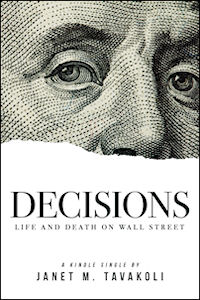
I fled the Islamic Republic of Iran with a suitcase, a thousand dollars, and no regrets. But it wasn't easy; I had to rebuild my life from scratch. Less than ten years later, I faced a decision that threatened to erase most of what I had accomplished, and I hesitated as I weighed the consequences.
In 1988, I lived and worked in Manhattan as Head of Mortgage Backed Securities Marketing for Merrill Lynch. I analyzed financial products, accompanied salespeople on customer calls, and spoke at seminars. Every morning I used the squawk box to broadcast a trade idea to the New York trading floor and U.S. branch offices: "sell this callable corporate, buy this tranche of a collateralized mortgage obligation," or vice versa. It was a great gig.
In our area of the vast trading floor, the curved continuous rows of desks with multi-line switchboards, Bloomberg terminals, computers, and squawk boxes rose in amphitheater-like tiers.
It was a late September morning. Everyone had a clear view of the stripper who removed her top to entertain the soon-to-be-married head options trader. The stripper finished her routine, and I shrugged it off and went back to work. My past objections to my boss had gone nowhere.
That afternoon, another stripper arrived to entertain another soon-to-be-married trader. She performed around 15 feet in front of me, in front of the men and women who worked for me, and in front of a visiting female customer, a bank portfolio manager. The spectacle was broadcast over the internal U.S. network. The music alerted everyone in the branch offices as to why business had stopped and distracted New York traders weren't answering their phones.
The stripper's face contorted in concentration. She was completely naked. She balanced on the arm of the trader's chair and thrust her hips towards his face -- I suppose Sheryl Sandberg would tell her to just "lean in."
Men gathered around to watch and shout encouragement or make lewd remarks. George, my boss, was in the front of the group.
"She could lose a little weight," said a male voice to my right.
"No way," responded another, "her tits would be smaller."
A young woman who worked for me walked off the trading floor. She scooted past me with a pained expression and whispered, "I'll be back when it's all over."
Another woman who worked for me was a devout Roman Catholic. She stared in stunned, angry silence, and then hid her head behind the papers on her desk, literally burying herself in her work.
I laughed inwardly. I had fled my ex-husband's homeland, Iran, in June 1979 for the land of liberty. The Islamic Republic of Iran forced unwilling women to wear the chador, a black sheet that covered their bodies and hair. Now, back home in the USA, my college-educated male colleagues, "the best and brightest," paid a woman during business hours to put on a show with nothing on her body. In both cases men tried to control the where, when, and how of female sexuality. This is still better than living in Iran, I thought. But it was a false choice, and anyway, at the moment I didn't feel liberated; I felt trapped by unpleasant choices. I made my decision.
I pulled the pin and tossed the career grenade. Merrill Lynch's entire U.S. trading network heard my easily-recognized voice broadcast over the music: "I wish to apologize to the women who work with me and for me. This performance is not an indication of management's attitude to the firm's female employees."
The next morning I stood outside Mike's [Head of the Mortgage Backed Securities Department] office and steeled myself before opening the door. I walked in and glanced at what he once told me was his favorite poster: an advertisement showing the horizontal contours of a nude, a wine bottle and a Ferrari 308GTB. The caption read: "decisions, decisions."
The iconic poster looked out of place in the office of this balding, overweight, middle-aged married man; there was a college dorm room wall somewhere just crying for it.
Mike eyed me coldly. "You know I've always supported your position one hundred percent. I wanted to stop it, but your broadcast tied my hands. It would have appeared to the guys that I was giving in to your demands. You're a big girl, you understand these things."
"I know you've always supported my point of view, and I'm sorry if anything I've done has inconvenienced you." I should have stopped there, but I soldiered on. "I don't recall broadcasting any demands, however."
"Do you realize," he said angrily, "that my boss might have heard you? Do you know what kind of a position that would have put me in?"
"Yes," I said, "I completely understand how awkward you must feel."
Mike grudgingly spoke again. "There will be no more strippers on the trading floor, and I don't ever want to hear anything more on the subject."
He didn't need to add that my career in the mortgage department was over. Years later I looked back on my decision to defy Merrill's status quo as one of many incidents in my career that informed my resolve to stand up to slick bullies spouting false narratives. It is counterintuitive, but the more tension-filled situations with uncertain outcomes one confronts, the easier it becomes to handle them. At that moment, however, I thought I had killed my career. I did not yet know that my abandonment of unwholesome appeasement was responsible for an exciting new beginning that would put me in a front row seat during the biggest financial crisis in world history.
The previous was excerpted with permission from Decisions: Life and Death on Wall Street, Janet Tavakoli's Wall Street memoir of how personal and professional decisions reshaped people's lives, drove some to despair, and changed the landscape of global finance.

